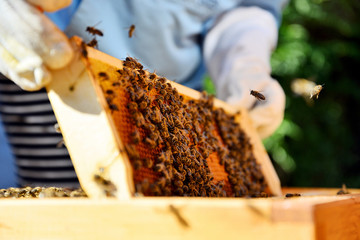Beekeeping, also known as apiculture, is a practice that involves the cultivation and management of honeybee colonies. It has been an integral part of agriculture and food production for centuries, providing not only delicious honey but also pollination services that are vital for the ecosystem and agricultural crops. In South Africa, beekeeping has gained popularity due to its numerous benefits and the sweet rewards it offers.
- Honey Production: The primary reward of beekeeping is, of course, the production of honey. South Africa is blessed with a diverse range of flora, resulting in a wide variety of delicious and unique honey flavors. From the floral fynbos honey of the Western Cape to the citrus-infused honey of the Eastern Cape, the country offers a rich honey production potential.
- Economic Opportunities: Beekeeping presents significant economic opportunities for individuals and communities in South Africa. It is a sustainable and relatively low-cost enterprise that can be pursued on a small scale, making it accessible to farmers and entrepreneurs with limited resources. Honey production, as well as the sale of other bee-related products such as beeswax and royal jelly, can generate income and create employment opportunities.
- Environmental Benefits: Bees play a crucial role in pollinating plants, including many crops that contribute to South Africa’s agricultural sector. By engaging in beekeeping, farmers can enhance pollination services on their farms, leading to increased crop yields and better quality produce. Additionally, bees contribute to biodiversity by supporting the reproduction of wild plants, thus helping to maintain healthy ecosystems.
- Conservation Efforts: Beekeeping can contribute to the conservation of indigenous bee species in South Africa. By creating suitable habitats and providing protection to honeybee colonies, beekeepers actively participate in the preservation of local bee populations. This is particularly important considering the global decline in bee populations due to various factors such as habitat loss, pesticide use, and climate change.
- Medicinal and Therapeutic Benefits: Apart from honey, beekeeping also allows for the production of other valuable products such as propolis, bee pollen, and royal jelly. These substances have been used for centuries in traditional medicine for their potential health benefits. In South Africa, there is growing interest in the development of natural health and wellness products derived from beekeeping, providing additional opportunities for entrepreneurs in the industry.
To harness the sweet rewards of honey production in South Africa, aspiring beekeepers should consider acquiring the necessary knowledge and skills through training programs and workshops offered by beekeeping associations and agricultural institutions. It is important to learn about beekeeping practices, hive management, disease prevention, and honey extraction techniques to ensure successful and sustainable honey production.
Furthermore, beekeepers should familiarize themselves with local regulations and obtain any required permits or licenses for keeping bees. It is essential to adhere to good beekeeping practices to maintain healthy colonies and minimize the risk of spreading diseases or pests.
By embracing beekeeping, individuals in South Africa can not only enjoy the sweet rewards of honey production but also contribute to environmental conservation, promote sustainable agriculture, and explore economic opportunities in the beekeeping industry.
Join 'Farmers Mag' WhatsApp Channel
Get the latest Farming news and tips delivered straight to your WhatsApp
CLICK HERE TO JOIN






